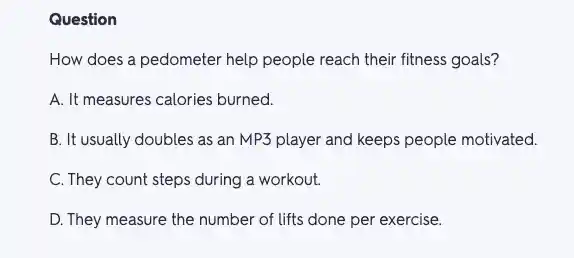How Does a Pedometer Help People Reach Their Fitness Goals?
At its core, a pedometer is a device that counts steps. This basic functionality belies its potential impact on an individual’s fitness journey. By providing immediate feedback on activity levels, it serves as a constant reminder and motivator to move more. Answering “How does a pedometer help people reach their fitness goals?” begins with understanding its role in measuring and encouraging incremental progress, a fundamental principle in building and maintaining a healthy lifestyle.

Short Answer: C. They count steps during a workout.
The Multifaceted Benefits of Using a Pedometer
The journey towards personal health and fitness is often a challenging yet rewarding endeavor, and tools that can aid in this pursuit are invaluable. Among these, pedometers stand out for their simplicity and effectiveness. Using a pedometer can promote a physically active lifestyle, and let’s delve into how this small device can have a significant impact on one’s fitness journey.
Encourages Incremental Activity
A key advantage of using a pedometer is its ability to motivate users to increase their daily physical activity in manageable increments. By setting achievable step goals, individuals are more likely to incorporate walking into their daily routines, turning a sedentary lifestyle into an active one. The psychological satisfaction of meeting or exceeding these targets can reinforce positive habits and lead to a more active lifestyle.
Facilitates Goal Setting and Achievement
Pedometers serve as tangible reminders of our fitness objectives. They allow for personalized goal setting, enabling users to start with modest targets and gradually increase them as their fitness improves. This approach fosters a sense of accomplishment and progression, which is crucial for maintaining motivation over the long term.
Monitors Progress Over Time
With the ability to track daily, weekly, and monthly activity, pedometers provide a clear picture of an individual’s physical activity trends. This data is instrumental in evaluating progress towards fitness goals and identifying areas for improvement. Monitoring progress can also inspire a sense of pride and accomplishment, encouraging continued effort.
Enhances Weight Management Efforts
Regular use of a pedometer can contribute significantly to weight management strategies. By increasing daily step counts, individuals burn more calories, which can lead to weight loss or help in maintaining a healthy weight. Moreover, the awareness of activity levels encourages mindful eating, aligning diet with physical activity.
Improves Mental Health
Physical activity is known to have a positive impact on mental health, and using a pedometer to increase this activity can enhance these benefits. Regular walks can reduce stress, anxiety, and symptoms of depression, contributing to an overall sense of well-being. The goal-oriented nature of pedometer use can also provide mental clarity and focus.
Supports Cardiovascular Health
By encouraging more consistent and prolonged physical activity, pedometers can play a crucial role in improving cardiovascular health. Increased activity levels can lead to lower blood pressure, improved circulation, and a decrease in the risk of heart disease. This makes pedometer use not just a tool for fitness but a partner in maintaining overall health.
Fosters Social Connections
Walking groups or challenges among friends and family can be facilitated by the use of pedometers. These social connections can provide additional motivation and enjoyment, making the journey towards fitness a shared and supportive experience.
Personal Insights and Emotional Connection
From my personal experience, the pedometer was a game-changer. Initially skeptical of its simplicity, I soon found the direct correlation between step counts and my overall sense of well-being impossible to ignore. The daily goal of 10,000 steps became a challenge I eagerly accepted, finding creative ways to incorporate more movement into my day. This tangible measure of my activity sparked a broader interest in fitness and nutrition, leading to substantial weight loss and improved stamina.
The Psychological Impact of Goal Setting
Setting achievable goals is a powerful motivator. A pedometer facilitates this by allowing for personalized target setting. Achieving these mini-milestones not only boosts confidence but also reinforces the habit of being active, making the journey towards fitness goals feel more attainable.
Analyzing the Effectiveness of Pedometers Through Examples
Consider the story of someone who started using a pedometer without any other changes to their lifestyle or diet. Over time, they noticed a significant improvement in their energy levels, lost weight, and felt more positive about their health. This anecdotal evidence underscores the device’s potential impact when used consistently.
The Intersection of Technology and Wellness
Today’s pedometers go beyond mere step counting. Many are integrated into smartwatches and fitness trackers that monitor heart rate, sleep patterns, and even provide workout suggestions. This evolution reflects the continuous improvement in how technology can support our health goals, making the integration of a pedometer into our lives a step towards a more informed approach to fitness.
Conclusion: A Step Towards Better Health
In answering “How does a pedometer help people reach their fitness goals?“, we’ve seen that it’s not just about the steps counted. It’s about how this simple device can inspire us to move more, understand our physical activity patterns, and set realistic goals for ourselves. Whether you’re just starting on your fitness journey or looking for ways to maintain your momentum, a pedometer can be a powerful ally in your quest for a healthier lifestyle.
Through personal commitment and the smart use of tools like pedometers, achieving our fitness goals is not just a possibility but an exciting journey of self-discovery and improvement.

